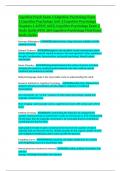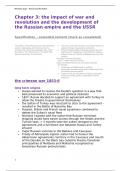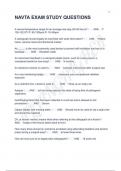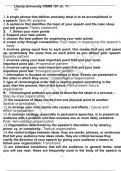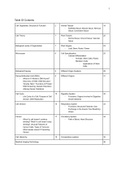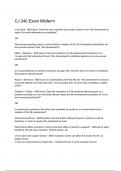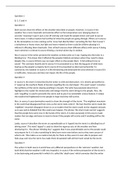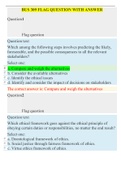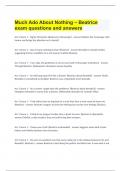2:Cognitive Psychology Unit 3:Cognitive Psychology
Chapters 1-6:PSYC 4455) Cognitive Psychology Exam 3
Study Guide:PSYC 364 Cognitive Psychology Final Exam
Study Guide.
Hermann Ebbinghaus - ANSWERStudied memory using nonsense syllables and the
method of saving.
Edward Titchener - ANSWERBelonged to structuralism- break consciousness down
into its elements or specific mental structures. His work spawned 3 other systems of
thought: functionalism, behavioralism, and gesalt psychology. Wundt trained
psychologist
Noam Chomsky - ANSWERDistinguished between the surface structure and deep
structure of a sentence; studied transformational rules that could be used to
transform one sentence to another
Believed language study is the most viable route to understanding the mind.
Research Methods in Cognitive Psychology - ANSWERReaction time- Elapsed time
between stimulus presentation and the subject's response to it (Mental
chronometry).
Eye movements- An "on-line" measure of information processing; reading and
language comprehension
Brain imaging- used associate various cognitive processes with various parts of the
brain.
Method of Saving - ANSWERafter memorizing the initial list, he compared the
number of times he had to read the list in order to rememorize it. If he rememorized
the list faster than he originally memorized it, he concluded that he remembered
something from the first time.
Subtracted # of trails it took to rememorize the list from the number of trails it
originally took to memorize the list. Divided quantity by the original number of trails
and multiplied everything by 100 to come up with the percent.
Forgetting Curve - ANSWERWithout practice, we forget rapidly then at a certain
point forgetting occurs at a much lesser rate.
Mental processes involved in memory - ANSWEREncoding- putting information into
memory
Storage- retaining information into memory
, Retrieval- recovering the information from memory
Tip of the tongue phenomenon - ANSWERProblem with retrieval
Recall and Recognition - ANSWERTwo most common methods of retrieval.
Recall- involves independently reproducing the information that you have been
previously exposed to
Recognition- involves realizing that a certain stimulus event is one you have seen or
heard before (MULTIPLE REST QUESTIONS ARE THIS!!!!!!!)
Generation-Recognition Model - ANSWERAn attempt to explain why you can usually
recognize more than you can recall; model suggests that recall involves the same
mental process involved in recognition plus another process not required for
recognition.
Recency Effect - ANSWERWords presented at the end of a list are remembered best
Primacy effect - ANSWERWords presented at the beginning of a list are remembered
second best
Clustering - ANSWERWhen asked to recall a list of words, people tend to recall words
belonging to the same category best.
Stage theory of memory - ANSWERThere are several different memory systems and
that each system has a different function. Memories enter the various systems in
specific orders. KNOW THIS SHIT FOR THE TEST!!!!!
1.) Sensory memory
2.) Short-term memory (working memory)
3.) Long-term memory
Sensory Memory - ANSWERcontains fleeting impressions of sensory stimuli
Visual memory - ANSWERIconic memory
Echoic Memory - ANSWERAuditory memory; memory lasts a few seconds
Whole-report procedure - ANSWERCapacity of sensory memory only 4 items.
Flashed visual display of 9 items and on average 4 items recalled.
Subjects were reporting what they saw, sensory memory of the array was decaying
George Sperling - ANSWERStudied the capacity of sensory memory using the partial-
report method.

